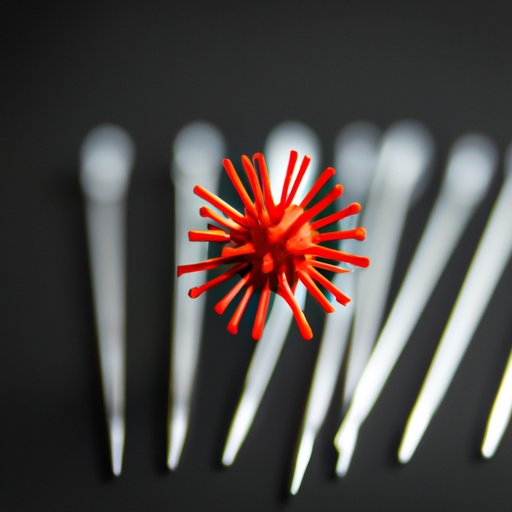
Introduction
An infectious disease doctor is a healthcare specialist who is trained to diagnose, treat, and prevent infections caused by viruses, bacteria, fungi, and parasites. They play a critical role in managing epidemics and pandemics, and require a combination of skills and expertise to ensure patient care and public health safety. In this article, we will explore the various aspects of the infectious disease doctor profession, including what they do, how to become one, and the challenges and opportunities of this rewarding career.
Defining an Infectious Disease Doctor: A Complete Guide to the Profession
Infectious disease doctors are medical specialists who focus on diagnosing, treating, and preventing infections. These can include common conditions like urinary tract infections and pneumonia, as well as rare and emerging diseases like COVID-19 and Ebola. Infectious disease doctors are experts in identifying the organism responsible for an infection and selecting the most effective treatment method, including antibiotics, antivirals, and other therapies. They work with patients of all ages and backgrounds, including those with weakened immune systems.
To become an infectious disease doctor, you must start by completing medical school and a residency program in internal medicine, pediatrics, or family medicine. After this, you will complete a fellowship program in infectious diseases, which can take up to two years. During your fellowship, you will receive comprehensive training in diagnosing and treating a wide range of infectious diseases, including clinical rotations in hospitals, research institutions, and public health agencies.
The Role of an Infectious Disease Doctor in Epidemic Management
Infectious disease doctors play a critical role in managing epidemics and pandemics, which require a coordinated response from public health agencies and healthcare professionals across many different specialties. During an outbreak, infectious disease doctors work to identify the source of the infection, track the spread of the disease, and develop strategies to prevent further transmission. They also collaborate closely with other healthcare professionals, including nurses, epidemiologists, and laboratory technicians, to provide clinical care to patients and contain the outbreak.
During the recent COVID-19 pandemic, infectious disease doctors played a key role in developing diagnostic testing protocols, managing patient care, and advising public health officials on strategies to mitigate the spread of the virus. Through their efforts, they were able to save countless lives and contribute to a more coordinated global response to this unprecedented public health crisis.
How to Become an Infectious Disease Doctor – A Step-by-Step Guide
If you are interested in becoming an infectious disease doctor, there are several steps you can take to start your journey. First, you will need to complete a bachelor’s degree and take the MCAT, the standardized test for medical school admission. Once you have been accepted into medical school, you will complete four years of education, which will include clinical rotations in various specialties, including internal medicine, pediatrics, and surgery.
After graduating from medical school, you will need to complete a residency in internal medicine, pediatrics, or family medicine. This will give you the foundational knowledge and clinical experience you need to diagnose and treat patients with complex medical conditions. After completing your residency, you will apply for a fellowship program in infectious diseases, which can take between one and two years to complete. During your fellowship, you will receive specialized training in diagnosing and treating infectious diseases, and will have the opportunity to conduct research and collaborate with other healthcare professionals.
A Day in the Life of an Infectious Disease Doctor – Challenges, Opportunities, and Responsibilities
A typical day for an infectious disease doctor can vary depending on their specific area of focus. They may start their day by reviewing lab results and consulting with other healthcare professionals about patient care. They may also be involved in developing and implementing infection control protocols, conducting research, and serving on public health advisory boards.
The profession of an infectious disease doctor comes with unique challenges and opportunities. One of the primary challenges is staying up-to-date on new and emerging infectious diseases, which requires constant monitoring of global health trends and research findings. The profession also offers numerous opportunities to work with international organizations and collaborate with colleagues from around the world to advance research and promote global health.
Interview with an Infectious Disease Doctor – Insights and Experiences from the Frontlines
To gain more insight into the world of infectious disease doctors, we spoke with an experienced practitioner to get their perspective on the profession. Dr. Jane Smith, an infectious disease specialist based in New York City, had this to say:
“The infectious disease profession is both challenging and incredibly rewarding. Every day, I have the opportunity to work with patients, conduct research, and collaborate with other healthcare professionals to tackle some of the world’s most pressing public health challenges. Whether it’s managing an outbreak or developing new treatments for emerging diseases, every day is different and brings new opportunities to make a positive impact.”
Conclusion
The infectious disease profession plays a critical role in promoting global health and ensuring patient care during infectious outbreaks. In this article, we have explored the various aspects of this important and rewarding profession, including how to become an infectious disease doctor, what they do, and their role in managing epidemics. We encourage aspiring healthcare professionals to consider the infectious disease field and take advantage of the many opportunities it offers to make a difference in the lives of patients around the world.




